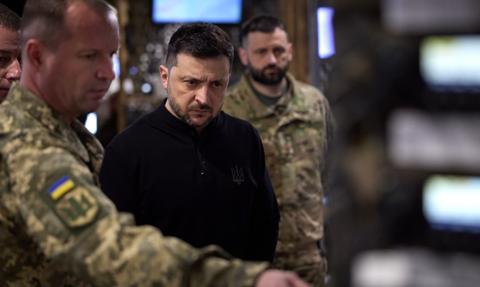During a time of dramatic change in the spheres of energy and geopolitics in the Central and Eastern European (CEE) region, most notably the recent disruption of Russian gas supply to this country, the field of Stanislaw's work seems ever more vital.
Stanislaw was in the country earlier this month on a client advisory trip at a time when civil rights groups were questioning Russia's democratic credentials in the recent elections there and while the construction of new energy transport links in and around Poland were being negotiated .
"I understand the Russian-Polish legacy," says Stanislaw. "My father's side was Polish and my mother's side was Russian," he explains. Having grown up in an Ohio steel-making community, heavy industry and Slavic culture flow in Stanislaw's veins.
Stanislaw has defined 'the Energy Company of the 21st Century', a model that he says can be traced back through history to one of the earliest oil industries, located in Poland. Around 1860, a Polish entrepreneur named Ignacy Lukaszewicz created what Stanislaw calls an "integrated oil company [and] the basis of the whole industry." At that time, Lukaszewicz saw demand for artificial light. In order to supply it, he found oil in Poland, extracted it, made barrels, a system of transporting them and the lanterns themselves.
According to Stanislaw, the energy companies of the future must be aware that they provide a 'service', as opposed to the basic provision of oil and gas. "The energy company of the 21st Century will be providing light, heat, power and mobility in the most economic and environmentally friendly fashion. Lukaszewicz extracted oil, but it was in order to provide clean, green light."
Some observers of the world energy economy point to 'the demise of the age of petroleum' and the coming 'hydrogen economy' of drastically cleaner fossil fuel use. Stanislaw is keen to identify a long transition period this century rather than a dramatic change in that direction. "We cannot change overnight," says Stanislaw. "We don't have the capacity to mass produce the hydrogen-fuel-cell car and the factories for it. It will take either a massive environmental disaster to shift public opinion or committed government leadership to achieve sustainable development in the relatively near term."
Stanislaw draws a comparison to explain the type of commitment that would be required. "There was once an almost superhuman effort, the choice of the United States to go to the moon. We did it in ten years. That was to put one rocket and one man on the moon. To replace the entire infrastructure of the system, to replace oil, is a huge effort, and the technology is not ready."
In the near term, meaning two generations or more, Stanislaw says that the biggest issue will not be the change to new energies nor the size of (or search for) fuel reserves, but the challenge of availability. "The challenge is to build a logistical infrastructure, to get it out of the ground and then move it to the marketplace. We need more pipelines in Russia, more in Central Asia and the Middle East, more tankers. Caspian oil is locked."
Stanislaw sees the freeing up of Central Asian oil, namely Caspian oil, as a new 'Great Game'. The Great Game, a phrase that Rudyard Kipling coined to describe the nineteenth-century competition between the Russian and British empires over Central Asia, involved bids for influence in a relatively unstable but highly strategic region stretching from the Caspian Sea to China.
Now, Stanislaw says the Great Game is between, "The US, the largest user of the world's natural resources... and Russia, the holder of the world's biggest gas reserves and one of the top four for oil reserves." For Stanislaw, the game is to establish economic linkages for 'ownership' of the resources. In his view, economics rather than imperial policy is the driving force. "How do you tie the markets to the supply source? That's the question," he states.
Though many analysts look to Central Asia, specifically Caspian oil as an alternative to supplies from the Middle East, Stanislaw says that all potential oil reserves should be accessible to the marketplace. Stanislaw points out that Iraqi oil is on a path of growing development. The timing of the release of Iraqi oil will effect price, and Stanislaw hopes that producer countries can cooperate to ensure a smooth transition.
Recent events in Russia, Belarus and Ukraine have prompted some observers to talk of a new totalitarian tendency developing in the former Soviet Union, in which control of the energy supply is the key path to power. Western consumers of Russian and Central Asian energy are pushing for a greater choice of supply routes - (pipelines) in order to offer multiple choices and a new element of price competition in world markets. While this desire is driven by sound commercial principles, and Russia's attempts to control the Eurasian pipeline network is also driven by the profit motive, Stanislaw recognises that the, "commanding heights of the energy industry" and political objectives cannot be detached from each other.
"Thanks to the control of energy supply, whole countries can be influenced. You cannot disentangle energy and geopolitical ambition from each other," he says. However, Stanislaw sees Russia's energy might as an opportunity for the funding of economic diversification and a force for positive change in the region rather than the likelihood of a new era of Russian imperialism. The new leadership in Moscow, Stanislaw predicts, "...will be more reform-oriented in terms of a more managed form of market development."
Energy-dominated Russian state revenues need to be reorganised, in Stanislaw's view. "Do you get more money as a government by owning the industry or by encouraging it and taxing it in an efficient fashion?" he asks. The answer is that, "There is no question that the more you let the private sector develop the resource, the more efficient it will be. Recent history has shown that."
Stanislaw believes that the taxing of privately owned businesses in an efficient way will be the best provision for an overhauled Russian health system, together with better education and the promotion of new enterprises. "There will probably be revisions to the Russian tax system with respect to oil, to get a larger share of oil revenues into the tax revenues. The more oil you produce efficiently, the more tax you get."
Natural gas is expected to be Russia's asset with the most promising growth. "The gas can go both East and West, not just to Europe," says Stanislaw. "China, Korea, Japan, South East Asia and the West coast of the USA, through liquid natural gas (LNG) and pipelines, could become massive growth areas [for Russian exports]," he explains.
But the key issue in this growing industry will be the mix of market and state ownership. Much of the Russian oil business is in the hands of private enterprise, but this is not the case for natural gas export, most of it being controlled by state-owned Gazprom.
"There are a lot of Russian gas fields that private oil companies own, but they are not developing them because they don't have access to the pipeline," says Stanislaw. He adds that they don't trust the pipeline owner to put the gas in the pipeline or pay a reasonable price for it.
In the future, he expects that Gazprom will control the pipeline system, but allow access to the pipeline to private producers of gas at market prices. As long as private oil or gas companies know that they can sell through the pipeline and get paid a real price for it, "They don't care who owns the pipeline... but their fear is that they won't get paid a real price."
"That brings us back to the 'Great Game'. Russia has thought it needs to control gas, because it can control the price it gets for the ultimate resource: natural gas," adds Stanislaw. He looks forward to Russia developing a process where it can manage its gas industry, allow more independent production to take place, get 'real' market prices for production, and still control export routes.
Although it would carry oil rather than gas, the proposed Odessa-Brody-Gdańsk pipeline is a case in point, with a major impact on Poland. Russian attempts to offer a 'reverse supply solution', temporarily filling the line with oil from the Russian pipeline network rather than Caspian oil shipped in to Odessa has been interpreted as a politically motivated idea. "Can one now, with half the pipeline built, find and create contracts with sellers as well as buyers. Can one reconnect the chain? There is a political issue there."
When extending his observations to Poland, Stanislaw says that here, "There has been a perception that refineries should stay in the hands of the state," as a key product provider just as at one stage airlines were deemed to be better placed in the hands of the state as a key service provider. "In the CEE region, downstream (refineries, etc) is not large but growing very fast," Stanislaw says. He adds that the Central European region is becoming dominated by PKN Orlen, Nafta Polska and MOL of Hungary. "Consolidation has precedence in Western Europe and the USA, and the reason is above all to drive down costs rather than a pre-conceived strategy to dominate a region."
Stanislaw is co-author of The Commanding Heights with Pulitzer Prize winner Daniel Yergin. In it, he makes an argument for private ownership of the means of production, the opposite of what Lenin had in mind when he first used the term 'the commanding heights' as part of his theory of command economics. As a Polish-Russian American, Stanislaw continues to advise governments once dominated by Lenin and his legacy.
Joseph Stanislaw is one of the world's most respected commentators on energy and geopolitics.


























































